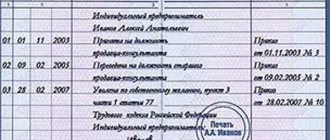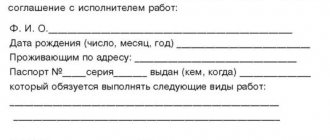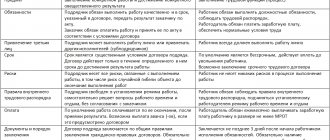Article 66. Work record book
The work book of the established form is the main document about the employee’s work activity and length of service.
The form, procedure for maintaining and storing work records, as well as the procedure for producing work record forms and providing them to employers are established by the federal executive body authorized by the Government of the Russian Federation.
(as amended by Federal Law No. 160-FZ of July 23, 2008)
The employer (with the exception of employers - individuals who are not individual entrepreneurs) maintains work books for each employee who has worked for him for more than five days, in the case where work for this employer is the main one for the employee.
(Part three as amended by Federal Law No. 90-FZ of June 30, 2006)
The work book contains information about the employee, the work he performs, transfers to another permanent job and the dismissal of the employee, as well as the grounds for termination of the employment contract and information about awards for success in work. Information about penalties is not entered into the work book, except in cases where the disciplinary sanction is dismissal.
At the request of the employee, information about part-time work is entered into the work book at the place of main work on the basis of a document confirming part-time work.
Part six is no longer valid. — Federal Law of June 30, 2006 N 90-FZ.
Documents to be presented when applying for a job
In accordance with Art. 65 of the Labor Code of the Russian Federation, it is necessary and sufficient to present:
- passport or other identification document;
- work book (except for situations when an employment contract for an employee is drawn up for the first time or he is accepted as a part-time worker);
- Pension Fund insurance certificate (except in cases where the employee does not have this document);
- military registration documents (for those liable for military service);
- documents on education or special training, if confirmation of the necessary qualifications is required;
- certificates of absence or expungement of a criminal record, if the work involves such a restriction.
From 01/01/2017, this list will be supplemented with a certificate of non-punishment for drug use, if such confirmation is required for work (Clause 1, Article 10 of the Federal Law “On Amendments to Certain Legislative Acts of the Russian Federation” dated 07/13/2015 No. 230-FZ ).
In some cases, the law may require the submission of additional documents, such as:
- certificate of medical examination;
- information about income and property;
- work permit for a foreigner.
Article 67. Form of employment contract
The employment contract is concluded in writing, drawn up in two copies, each of which is signed by the parties. One copy of the employment contract is given to the employee, the other is kept by the employer. The employee’s receipt of a copy of the employment contract must be confirmed by the employee’s signature on the copy of the employment contract kept by the employer.
(as amended by Federal Law No. 90-FZ of June 30, 2006)
An employment contract that is not formalized in writing is considered concluded if the employee began work with the knowledge or on behalf of the employer or his representative. When an employee is actually admitted to work, the employer is obliged to draw up an employment contract with him in writing no later than three working days from the date the employee is actually admitted to work.
(as amended by Federal Law No. 90-FZ of June 30, 2006)
What form does the employment contract take?
The procedure for concluding an employment contract (hereinafter referred to as TD) involves its execution only in writing (paragraph 1 of article 67 of the Labor Code of the Russian Federation of December 30, 2001 No. 197-FZ). Each party to the legal relationship must receive 1 copy of the original of such a document with all the appropriate signatures.
On May 5, 2020, an experiment to introduce an electronic labor contract began in Russia.
Participation in the experiment is optional. Employers initially apply to participate. But an employee who gets a job in an organization with experimental electronic document management is involved in the experiment only with written consent.
This implies registration of labor relations using the employer’s own information system or the “Work in Russia” system.
The experiment period is until 03/31/2021
According to Article 309.2 of the Labor Code of the Russian Federation, micro-enterprises (individual entrepreneurs, cooperatives and other entities that meet the requirements of Part 3 of Article 4 of the Federal Law of July 24, 2007 No. 209-FZ “On the development of small and medium-sized businesses in the Russian Federation”) from January 1, 2017 are allowed to use a standard form of an employment contract approved by the Government of the Russian Federation in Resolution No. 858 dated August 27, 2016 “On the standard form of an employment contract concluded between an employee and an employer - a small business entity that is classified as a micro-enterprise.”
In practice, there are cases when an employee begins to perform his job duties with the knowledge or on behalf of the employer even before the proper registration of the TD. Then the agreement in writing must be concluded within a maximum of 3 days from the moment such an employee actually goes to work (see paragraph 12 of Resolution of the Plenum of the RF Armed Forces dated March 17, 2004 No. 2, hereinafter referred to as Resolution No. 2).
Some professions require a special approach when concluding an employment contract. Which one you can find out here:
“We are drawing up an employment contract with the athlete,”
“We are drawing up an employment contract with the coach,”
“Employment contract with the chief accountant.”
Article 68. Registration of employment
Hiring is formalized by an order (instruction) of the employer, issued on the basis of a concluded employment contract. The content of the order (instruction) of the employer must comply with the terms of the concluded employment contract.
The employer's order (instruction) regarding employment is announced to the employee against signature within three days from the date of actual start of work. At the request of the employee, the employer is obliged to provide him with a duly certified copy of the specified order (instruction).
(as amended by Federal Law No. 90-FZ of June 30, 2006)
When hiring (before signing an employment contract), the employer is obliged to familiarize the employee, against signature, with the internal labor regulations, other local regulations directly related to the employee’s work activity, and the collective agreement.
(Part three as amended by Federal Law No. 90-FZ of June 30, 2006)
Procedure for changing an employment contract
The concluded employment contract is changed in accordance with the standards determined by Chapter 12 of the Labor Code of Russia. Adjustments to the content of the work act can only be made by agreement of the parties or with the obligatory written consent of the subordinate. Any amendments to the document are confirmed in writing.
An exception is the transfer of a working person to another service according to the recommendation of a medical worker (requirement of Article 73). If the employer wishes to make amendments regarding structural or organizational aspects of production, this can be done without the permission of the subordinate. In the first case, the boss is obliged to find out about the consent of the transferred person, and if he refuses, remove the latter from work while maintaining his place. In the second, the labor function cannot be replaced.
Article 70. Employment test
(as amended by Federal Law No. 90-FZ of June 30, 2006)
When concluding an employment contract, by agreement of the parties, it may include a provision for testing the employee in order to verify his compliance with the assigned work.
The absence of a probationary clause in the employment contract means that the employee was hired without a trial. In the event that an employee is actually allowed to work without drawing up an employment contract (part two of Article 67 of this Code), the probationary clause can be included in the employment contract only if the parties formalized it in the form of a separate agreement before starting work.
During the probationary period, the employee is subject to the provisions of labor legislation and other regulatory legal acts containing labor law norms, collective agreements, agreements, and local regulations.
A hiring test is not established for:
persons elected through a competition to fill the relevant position, conducted in the manner established by labor legislation and other regulatory legal acts containing labor law norms;
pregnant women and women with children under the age of one and a half years;
persons under the age of eighteen;
persons who have graduated from state-accredited educational institutions of primary, secondary and higher vocational education and are entering work for the first time in the acquired specialty within one year from the date of graduation from the educational institution;
persons elected to elective positions for paid work;
persons invited to work by way of transfer from another employer as agreed between employers;
persons concluding an employment contract for a period of up to two months;
other persons in cases provided for by this Code, other federal laws, and a collective agreement.
The probationary period cannot exceed three months, and for heads of organizations and their deputies, chief accountants and their deputies, heads of branches, representative offices or other separate structural divisions of organizations - six months, unless otherwise established by federal law.
When concluding an employment contract for a period of two to six months, the probationary period cannot exceed two weeks.
The period of temporary incapacity for work and other periods when the employee was actually absent from work are not included in the probationary period.
Labor Code of the Russian Federation
Chapter 11. Conclusion of an employment contract
Article 63. Age at which it is permissible to conclude an employment contract
The conclusion of an employment contract is allowed with persons who have reached the age of sixteen years.
In cases of receiving basic general education or leaving a general educational institution in accordance with federal law, an employment contract can be concluded by persons who have reached the age of fifteen years.
With the consent of one of the parents (guardian, custodian) and the guardianship and trusteeship authority, an employment contract can be concluded with a student who has reached the age of fourteen years to perform light labor in their free time that does not harm their health and does not disrupt the learning process.
In cinematography organizations, theaters, theatrical and concert organizations, circuses, it is allowed, with the consent of one of the parents (guardian, trustee) and the guardianship and trusteeship authority, to conclude an employment contract with persons under the age of fourteen to participate in the creation and (or) performance of works without harming health and moral development.
Article 64. Guarantees when concluding an employment contract
Unreasonable refusal to conclude an employment contract is prohibited.
Any direct or indirect restriction of rights or the establishment of direct or indirect advantages when concluding an employment contract depending on gender, race, skin color, nationality, language, origin, property, social and official status, place of residence (including the presence or lack of registration at the place of residence or stay), as well as other circumstances not related to the business qualities of employees, are not allowed, except in cases provided for by federal law.
It is prohibited to refuse to conclude an employment contract to women for reasons related to pregnancy or the presence of children.
It is prohibited to refuse to conclude an employment contract to employees invited in writing to work by way of transfer from another employer, within one month from the date of dismissal from their previous place of work.
At the request of a person who is refused to conclude an employment contract, the employer is obliged to provide the reason for the refusal in writing.
Refusal to conclude an employment contract can be appealed in court.
Article 65. Documents presented when concluding an employment contract
When concluding an employment contract, a person applying for work presents to the employer:
— passport or other identity document; — work book, except for cases when an employment contract is concluded for the first time or the employee starts working on a part-time basis; — insurance certificate of state pension insurance; - military registration documents - for those liable for military service and persons subject to conscription for military service; - a document on education, qualifications or special knowledge - when applying for a job that requires special knowledge or special training.
In some cases, taking into account the specifics of work, this Code, other federal laws, decrees of the President of the Russian Federation and decrees of the Government of the Russian Federation may provide for the need to present additional documents when concluding an employment contract.
It is prohibited to require from a person applying for a job documents other than those provided for by this Code, other federal laws, decrees of the President of the Russian Federation and decrees of the Government of the Russian Federation.
When concluding an employment contract for the first time, a work book and an insurance certificate of state pension insurance are issued by the employer.
Article 66. Work record book
The work book of the established form is the main document about the employee’s work activity and length of service.
The form, procedure for maintaining and storing work records, as well as the procedure for producing work record forms and providing them to employers are established by the Government of the Russian Federation.
See the Instructions on the procedure for maintaining work books at enterprises, institutions and organizations, approved by Decree of the USSR State Committee for Labor of June 20, 1974 N 162
An employer (with the exception of individual employers) is obliged to keep work books for each employee who has worked in an organization for more than five days, if the work in this organization is the main one for the employee.
The work book contains information about the employee, the work he performs, transfers to another permanent job and the dismissal of the employee, as well as the grounds for termination of the employment contract and information about awards for success in work. Information about penalties is not entered into the work book, except in cases where the disciplinary sanction is dismissal.
At the request of the employee, information about part-time work is entered into the work book at the place of main work on the basis of a document confirming part-time work.
Entries in the work book about the reasons for termination of the employment contract must be made in strict accordance with the wording of this Code or other federal law and with reference to the relevant article, paragraph of this Code or other federal law.
Article 67. Form of employment contract
The employment contract is concluded in writing, drawn up in two copies, each of which is signed by the parties. One copy of the employment contract is given to the employee, the other is kept by the employer.
An employment contract that is not properly executed is considered concluded if the employee began work with the knowledge or on behalf of the employer or his representative. When an employee is actually admitted to work, the employer is obliged to draw up an employment contract with him in writing no later than three days from the date the employee is actually admitted to work.
When concluding employment contracts with certain categories of employees, laws and other regulatory legal acts may provide for the need to agree on the possibility of concluding employment contracts or their terms with the relevant persons or bodies that are not employers under these contracts, or to draw up employment contracts in a larger number of copies.
Article 68. Registration of employment
Hiring is formalized by an order (instruction) of the employer, issued on the basis of a concluded employment contract. The content of the order (instruction) of the employer must comply with the terms of the concluded employment contract.
The employer's order (instruction) regarding employment is announced to the employee against signature within three days from the date of signing the employment contract. At the request of the employee, the employer is obliged to provide him with a duly certified copy of the specified order (instruction).
When hiring, the employer is obliged to familiarize the employee with the internal labor regulations in force in the organization, other local regulations related to the employee’s labor function, and the collective agreement.
Article 69. Medical examination when concluding an employment contract
Persons under the age of eighteen, as well as other persons in cases provided for by this Code and other federal laws, are subject to mandatory preliminary medical examination when concluding an employment contract.
Article 70. Employment test
When concluding an employment contract, the agreement of the parties may stipulate the testing of the employee in order to verify his suitability for the assigned work.
The probationary clause must be specified in the employment contract. The absence of a probationary clause in the employment contract means that the employee was hired without a trial.
During the probationary period, the employee is subject to the provisions of this Code, laws, other regulatory legal acts, local regulations containing labor law standards, collective agreements, and agreements.
A hiring test is not established for:
- persons applying for work through a competition for filling the corresponding position, held in the manner prescribed by law; — pregnant women; - persons under the age of eighteen; — persons who have graduated from educational institutions of primary, secondary and higher vocational education and are entering work for the first time in their specialty; — persons elected (selected) to an elective position for paid work; — persons invited to work by way of transfer from another employer as agreed between employers; - in other cases provided for by this Code, other federal laws and the collective agreement.
The probationary period cannot exceed three months, and for heads of organizations and their deputies, chief accountants and their deputies, heads of branches, representative offices and other separate structural divisions of organizations - six months, unless otherwise established by federal law.
The period of temporary incapacity for work and other periods when the employee was actually absent from work are not included in the probationary period.
Article 71. Result of employment test
If the test result is unsatisfactory, the employer has the right to terminate the employment contract with the employee before the expiration of the test period by warning him in writing no later than three days in advance, indicating the reasons that served as the basis for recognizing this employee as having failed the test. The employee has the right to appeal the employer's decision in court.
If the test result is unsatisfactory, the employment contract is terminated without taking into account the opinion of the relevant trade union body and without payment of severance pay.
If the probation period has expired and the employee continues to work, then he is considered to have passed the test and subsequent termination of the employment contract is allowed only on a general basis.
If during the probationary period the employee comes to the conclusion that the job offered to him is not suitable for him, then he has the right to terminate the employment contract at his own request by notifying the employer in writing three days in advance.
← Previous chapter (10) • Next chapter (12) →
Article 71. Result of employment test
If the test result is unsatisfactory, the employer has the right to terminate the employment contract with the employee before the expiration of the test period by warning him in writing no later than three days in advance, indicating the reasons that served as the basis for recognizing this employee as having failed the test. The employee has the right to appeal the employer's decision in court.
(as amended by Federal Law No. 90-FZ of June 30, 2006)
If the test result is unsatisfactory, the employment contract is terminated without taking into account the opinion of the relevant trade union body and without payment of severance pay.
If the probation period has expired and the employee continues to work, then he is considered to have passed the test and subsequent termination of the employment contract is allowed only on a general basis.
When does the employment contract come into force?
According to the current standards of the Labor Code of the Russian Federation, any working relationship must be documented. That is, when hiring, the employer and the future employee must agree on all the terms of cooperation.
The agreements reached on the place of work, position, salary level, working hours and other conditions must be fixed in the employment contract. Or in a civil law agreement, if the emerging relationship cannot be classified as labor. However, regardless of the category of relationship, there must be a formal agreement. (At the end of the article there are links to 10 samples of employment contracts - use them in your work.)
So, the document has been drawn up, printed in duplicate and is completely ready for signing by the interested parties. From what moment does the employment contract come into force, from what day do the employer and employee have mutual obligations? Let's figure it out.
Form and meaning of the employment contract
An employment contract is a voluntary, mutual agreement between two parties, describing their mutual responsibilities and rights. According to the contract, the employer undertakes to provide the employee with the tasks and working conditions described in this contract. The employee, in turn, guarantees independent, responsible and high-quality performance of his duties.
The procedure for concluding and executing an employment contract involves the written confirmation of the agreed obligations. Only in this case do the parties to the contract claim to protect their rights in court.
Important!
According to Art. 67 of the Labor Code of the Russian Federation, an employment contract is concluded exclusively in writing, in two copies. The employer is obliged to formalize the employment relationship with the employee within three days after the actual admission to work.
It is the employment agreement that describes the conditions under which the employee performs his duties. For the employee, this is a guarantee of timely payments, sick leave or vacation. Refusal to comply with the norms established by law leads to administrative liability.
Legal assistance with drawing up an employment contract:
Rules and stages of the procedure for drawing up an employment contract
The Labor Code of the Russian Federation does not contain a strict sample employment agreement. In accordance with Art. 57, the document must contain:
- name of the company and full name of the employee applying for the position;
- position and type of work (main or part-time);
- date of actual employment;
- end date of service when applying for a fixed-term employment contract;
- mutual rights and obligations;
- the amount of salary, bonus, condition of payment of allowances;
- schedule;
- the procedure for payment and the amount of monetary compensation in the event of an industrial injury or harm to the physical health of an employee.
Important!
The employer is required to include each of the listed points in the agreement. Otherwise, the contract may be declared invalid.
Registration of employment under an employment contract is carried out in three main stages:
- The employee provides an identity card, TIN and SNILS to the employer. If the job requires special physical skills or the work is harmful to health, the employee will be required to undergo a preliminary medical examination. The candidate must agree to this procedure. If a citizen enters an official position for the first time and cannot provide a work book, the employer is responsible for processing it.
- Issuing an employment agreement, familiarizing the employee with it and signing the contract. The agreement comes into legal force from the moment the relevant document is signed or the employee is actually admitted to the place of work.
- Issuing an order to hire an employee. The terms and conditions of the document must comply with the terms described in the employment agreement. The employer enters the necessary information into the employee’s work book and provides a copy of the employment order.
Important!
according to Art. 69 of the Labor Code of the Russian Federation, the employer undertakes to familiarize the employee with labor and safety rules, company regulations, and other regulations. The employee confirms his awareness with a personal signature.
We conclude an agreement
So, the candidate for the vacant position successfully passed the interview. All terms of cooperation were agreed upon and documented. The finished text of the agreement is awaiting signing. From what moment is an employment contract considered concluded?
So, the date of signing the document is the date of its conclusion. In usual practice, this date is recorded at the very beginning of the document, namely in its header. The date of conclusion and place are indicated here. For example, 12/07/2018, St. Petersburg. In other words, the employment contract is considered concluded from the moment it is signed.
Therefore, from December 7, 2018, the contract with the new employee is considered concluded. However, this does not mean that this document comes into force on the same day. Officials have identified a number of exceptional conditions.
Entry into force
First of all, let’s define what the wording “comes into force” means. This is the point in time from which the document begins to be legally valid, and all obligations, requirements and conditions specified in it become binding.
As we noted above, officials have identified several options for timing. These include dates:
- Signing the document. In this case, the TD will enter into force on the day of its conclusion. A corresponding entry is made in the text of the contract. For example: an employment contract comes into force from the date of its signing.
- Enshrined in federal laws or other regulations. For example, in accordance with certain regulations, some specialists are required to be approved for positions. So, the contract is concluded on one day, and begins on the day of issuing the corresponding order approving the employee in a new position.
- When the employee started or was allowed to work. This option is relevant if the contract was not executed properly or contains violations. In this case, the agreement is considered to come into force from the moment the specialist is actually admitted to work.
- Enshrined in the text of the agreement itself. Let us immediately note that this can be any value. For example, a contract was signed on December 7, but comes into force only a week or month later. In this case, a corresponding entry is made in the text.
Mandatory conditions in an employment contract
- place of work
A common mistake employers make is confusing the place of work with the workplace.
The place of work is a mandatory condition for inclusion in the employment contract, while the workplace is an additional condition (may or may not be in the employment contract). There is no definition of the place of work in the legislation, but based on the theory of labor law, the place of work is understood as a specific organization located in a certain area (settlement). This is confirmed by the wording from Part 2 of Art. 54 of the Civil Code of the Russian Federation, which states that the location is determined by the registration address of the legal entity through the indication of the locality.
If the State Labor Inspectorate requires the indication of a specific legal address in the employment contract, then this can be regarded as unlawful actions.
- labor function
Labor law experts do not have a common understanding of what a labor function is, so it is better to indicate in an employment contract not only the name of the position, profession, specialty, but also to prescribe the specific type of assigned work in general words: accounting, interaction with clients, etc. .
The second option: specify job responsibilities in the text of the employment contract.
The third option: make a reference to the job description in the employment contract. A job description is an independent local regulatory act that an employee becomes familiar with before signing an employment contract. In the employment contract itself, in addition to the name of the position, profession, specialty, there may be a reference norm for the job description.
- start date
The start date of work may differ from the date of conclusion of the employment contract. When the employee is actually allowed to work, the employment contract is considered concluded, but in this case the employer must formalize it in writing no later than within 3 days from the moment the employee is actually allowed to work.
- terms of remuneration
The employer is also obliged to specify the size of the employee's tariff rate or salary (official salary), additional payments, allowances and incentive payments.
If local regulations, wage regulations, internal labor regulations, collective agreements, and bonus regulations provide for compensation and incentive payments (they all have their own names: “additional payment for night work,” “long-service bonus,” “ bonus based on the results of work for the year,” etc.), then the employer’s task is, when hiring an employee, to choose from all local regulations what will apply to a specific employee. And then name these payments, separated by commas, in the text of the employment contract.
It is impossible to write in an employment contract that “the employee may be paid other additional payments...”, as this would be a violation of Art. 57 Labor Code of the Russian Federation. However, having listed payments separated by commas, the employer has the right not to name their amounts.
From October 3, 2020, it is not necessary to indicate the terms of payment of wages in the employment contract.
- working hours and rest hours
This condition becomes mandatory only if for a particular employee the working time and rest time regime differs from the general rules in force for this employer. We are talking about part-time workers, minors, disabled people of groups I and II, etc.
In Art. 100 of the Labor Code of the Russian Federation specifies how to prescribe working hours.
- guarantees and compensation for work under harmful and (or) dangerous working conditions
This condition is mandatory if the employee is hired under appropriate conditions. It is necessary to indicate the characteristics of working conditions in the workplace. In Art. 219 of the Labor Code of the Russian Federation clearly states that the amount, procedure and conditions for providing guarantees and compensation to employees engaged in work with harmful and (or) dangerous working conditions are established in the manner prescribed by Art. 92, 117 and 147 of the Labor Code of the Russian Federation.
- conditions that determine, in necessary cases, the nature of the work (mobile, traveling, on the road, other nature of work)
There is not a single regulatory legal act that would define what traveling work, work on the road, etc. means. However, Letter of Rostrud dated December 12, 2013 No. 4209-TZ tries to bring some clarity to this issue.
It is important to remember that first a local regulatory act must appear, according to which the position is considered to be a traveling nature of the work, and then this condition is fixed in the employment contract.
- working conditions in the workplace
This condition is mandatory for inclusion in employment contracts concluded after January 1, 2014.
If the employer has never carried out workplace certification and a special assessment of working conditions, he cannot prescribe working conditions in the workplace. To do this, he must have valid workplace certification results or the results of a special assessment of working conditions.
According to the degree of harmfulness and (or) danger, working conditions are divided into four classes - optimal, acceptable, harmful and dangerous (Article 14 of the Federal Law of December 28, 2013 No. 426-FZ).
The definition of the concept of “working conditions” is given in Art. 209 Labor Code of the Russian Federation. This is a combination of factors in the production environment and the labor process that affect the performance and health of the employee.
In the ideal version of the employment contract, after the employer has prescribed the class, working conditions, on the basis of which special assessment report, from the SOUT card (it contains line 30 “Factors of the working environment and labor process”), he needs to transfer those production factors into the text of the employment contract factors that were identified during a specific workplace assessment.
- condition on compulsory social insurance of the employee
Some employers include this condition with the phrase that the employee is subject to compulsory social insurance in accordance with current legislation. Some describe types of insurance.
When to start working
According to Art. 57 of the Labor Code of the Russian Federation, the day from which the employee must begin performing his immediate duties must be indicated in the contract without fail. By the specified date, the employer undertakes to prepare the workplace, ensure unhindered access and the opportunity to work. The worker must appear at the appointed hour and begin work.
In reality, the date of the employment contract and the start date of work may not coincide. For example, an agreement was concluded on November 30, the document came into force on December 5, and the specialist must begin work on the same day.
We cancel the agreement
The employer has the legal right to cancel the agreement. Yes, Art. 61 of the Labor Code of the Russian Federation establishes that if a new employee does not start work on the appointed day, the employer can cancel the concluded contract. A canceled employment contract is considered not concluded (Part 4 of Article 61 of the Labor Code of the Russian Federation). In case of cancellation of the contract, the employer does not bear any obligations to the employee. At the same time, the employee retains the right to receive social insurance if, during the period from the date of conclusion of the contract to the day of its cancellation, an insured event occurs to him.










